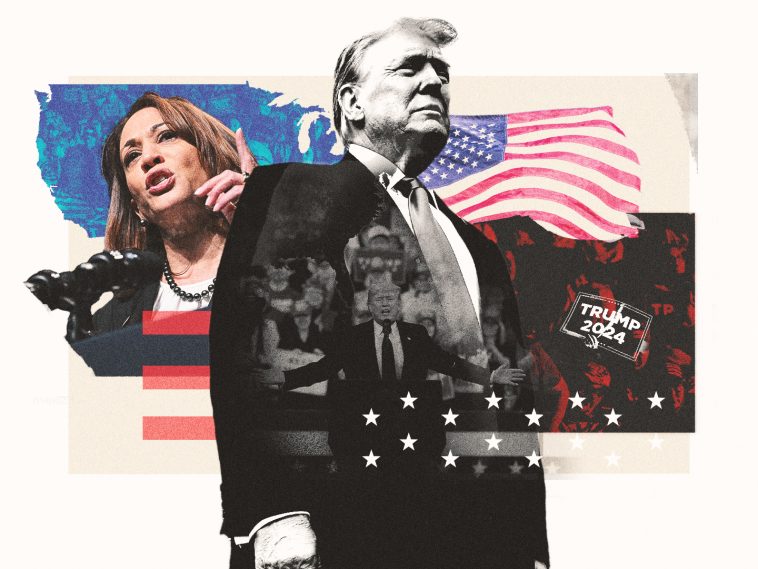The political landscape has taken a surprising turn with Vice President Kamala Harris now facing off against ex-president Donald Trump after President Joe Biden bowed out. Republicans appear less than thrilled about this development as their once strong confidence now seems to be wavering. Amidst this turbulence, the Democratic positioning has shown unexpected resilience.
According to a recent USA TODAY/Suffolk Poll, Harris has now surpassed ex-president Trump with a narrow lead of 48%-43%. It would seem Democrats have managed to regain some momentum. However, this lead falls within the poll’s margin of error. With a televised debate on the horizon, the outcome remains uncertain.
The GOP convention in July had left most Republicans, even those on Trump’s campaign team, confident about a victory come November. However, the sudden shift in dynamics with Biden sidelined and Harris in the lead, has clearly thrown a wrench in this prediction, leaving the results up for speculation.
Tracy Vega, a former Republican converted Democrat from Sacramento, was quoted expressing her slightly comical satisfaction with Biden stepping aside to let in ‘some young blood.’ The ‘Harris-Walz campaign’, as she referred to it, seems to represent hope and has gained traction in recent weeks.
Democrats seem to be gathering momentum down the ballot as well. A shift could be noticed from June when registered voters leaned towards the local GOP candidate with a 47%-45% margin, to now when probable voters slightly favor the Democratic candidate over the Republican with a 48%-43% statistic.
Trump labelled the exchange of Harris for Biden as ‘undemocratic.’ Seemingly confused by her popularity despite her lack of success during the 2020 presidential election bid, Trump questioned the process. One cannot help but ponder if this confusion stems from his own attempt to understand the democratic process or a genuine bewilderment over Harris’s sudden rise.
Democrats, however, experience no such confusion as an overwhelming 94% agree that Biden stepping down was the right move. Furthermore, 92% believe nominating Harris to be the Democrats’ correct decision. An intriguing perspective coming from a party that surely would have benefited by fostering discord amongst their political opponents.
Liesl Semper, an independent leaning towards the Democratic Party, pointed out the paradox of ageism being decried but also strategically used to supposedly help win the election. It’s an ironic twist, perhaps symbolic of many voters’ struggle between ideological posturing and political pragmatism.
Interestingly, enthusiasm amongst Trump supporters remains unchanged from June, standing steady at 60%. However, enthusiasm amongst Harris supporters has soared to 68%, mirroring a significant surge in Democratic optimism. They appear more energized and motivated, a drastic contrast from the 30% reported earlier for Biden supporters.
Despite Trump’s previous major advantages over Biden in June, these have significantly decreased when pitted against Harris on key issues. The economy, immigration, national security, and dealings with China all show Trump’s lead dropped dramatically. All the while, Harris gains traction with voters, narrowing the gaps once enjoyed by Trump.
Harris’s position appears even stronger when it comes to health care and race relations, where she holds a 14 and 19 point advantage respectively. These figures outstrip the leads Biden once had in these areas, inviting the interesting question of whether replacing Biden with Harris was a masterstroke by the Democrats or a fortuitous misstep by Republicans.
Of course, it goes without saying that not every American citizen feels positively about the prospect of a Harris presidency. One such individual is Republican Melissa Bennett, an office manager and Trump enthusiast. She expressed a chilling prophecy of ‘looking weak’ should Harris become commander-in-chief, an unsubstantiated claim rooted in fear and apprehension rather than fact.
A dominant 68% of Harris supporters express a lot of confidence that the votes will be accurately counted and reported, whereas only 11% of Trump supporters share this level of trust in the process. The remaining Trump supporters divide between somewhat confident and not confident. Novel move, one might say, to question the system’s legitimacy when the odds aren’t in one’s favor.
The anxiousness around the election’s legitimacy extends to the potential aftermath. A shocking 27% of Trump supporters have already indicated a refusal to accept the election result if their candidate doesn’t triumph. One can’t help but recall the unfortunate incidents of January 6, 2021, around the Capitol.
Fast forward from June, a significantly high 87% of Harris supporters predict their candidate will win, a jump of 14 points. However, there is a noticeable plunge in Trump supporters’ belief in their candidate’s victory, falling from 88% to 76%. Are we witnessing a sobering up of the ‘Trump fever’ that once had the followers in its throes, or just the wavering uncertainty of an unpredictable political climax?
Thus, as the unexpected twists and turns of this election season unfurl, one can’t help but ponder how these political maneuvers and public sentiments will play out on the canvas of the actual Election Day, etching a new chapter in the annals of American politics.


